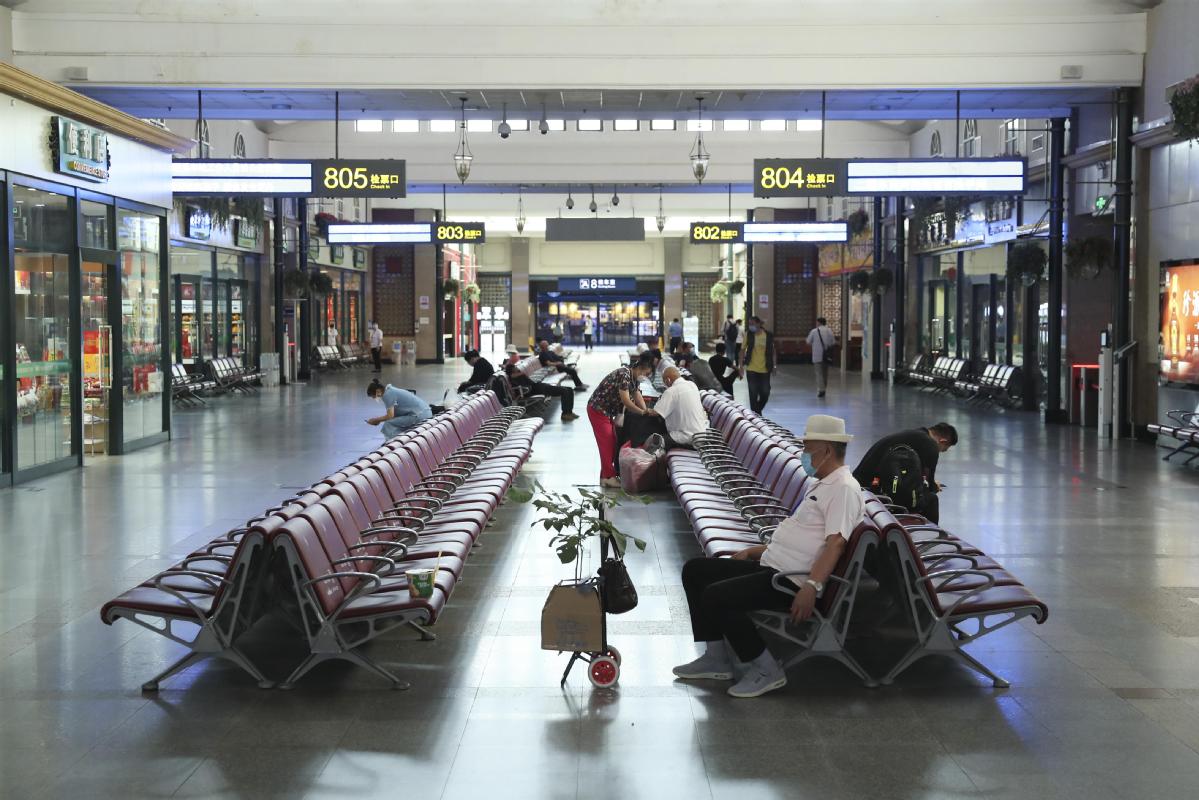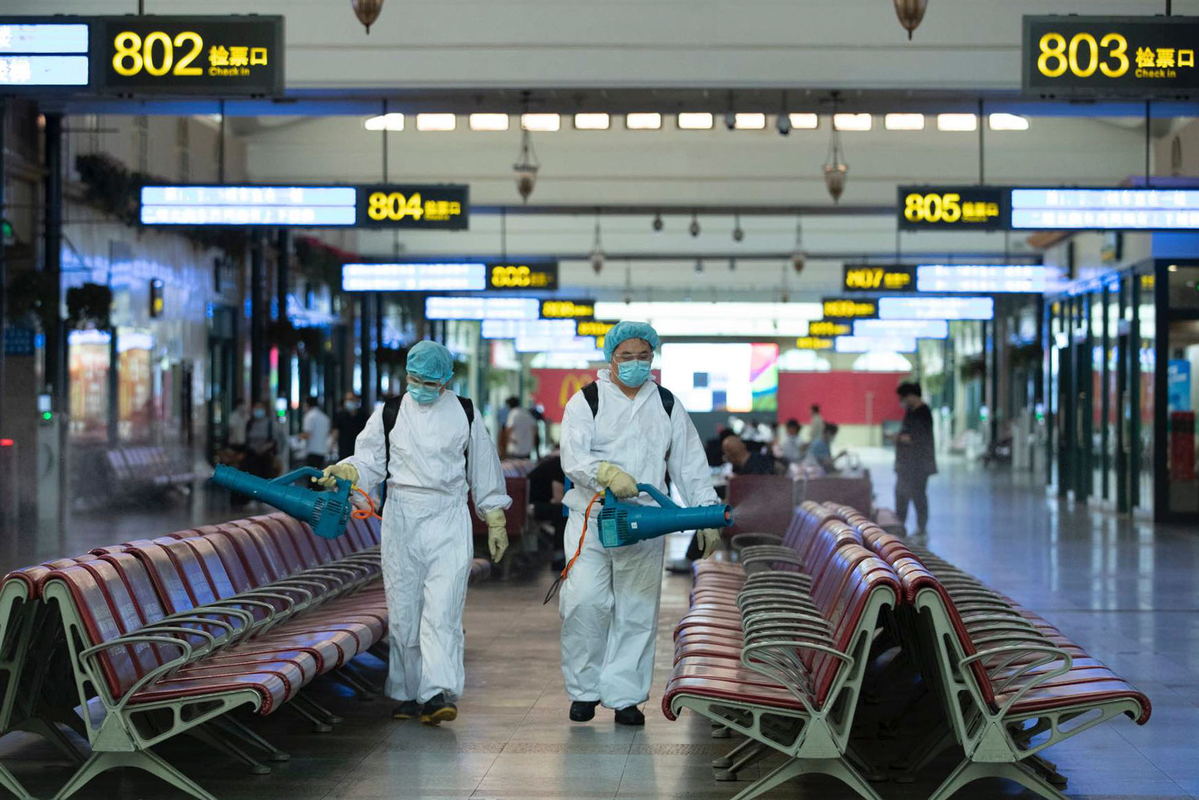


Few passengers wait at the Beijing Railway Station on Thursday. Since the new outbreak in the city started on June 11, virus control measures have been implemented that include community access restrictions, requiring people to take nucleic acid tests and enacting new travel curbs and rules. ZOU HONG/CHINA DAILY
The recent outbreak of COVID-19 cases in Beijing is under control as the city has seen a decline in confirmed cases, but the caseload will continue to grow for some time, health expert Wu Zunyou said on Thursday.
"It's positive that Beijing has controlled the epidemic. All the cases reported today were infected before June 12," said Wu, chief epidemiologist at the Chinese Center for Disease Control and Prevention.
He added that the full tally of locally transmitted cases will continue to emerge in the coming days, but the number of cases will decrease over time, since the newly added cases were just new confirmations, not new infections.
The city reported 21 new cases of COVID-19 on Wednesday, 10 cases less than the previous day. All the cases are related to Xinfadi wholesale market in Beijing's Fengtai district, according to Pang Xinghuo, deputy head of the Beijing Center for Disease Control and Prevention.
Beijing reported eight clusters of coronavirus infection as of Wednesday, all of which were closely connected with the Xinfadi market, according to Pang.
Research and sampling have been conducted at the market over the past few days, which showed that infected seafood vendors outnumbered vendors with positive results in beef, mutton and other sections. Those seafood vendors tended to show COVID-19 symptoms earlier than other workers, Wu said.
The facility with the seafood section also was found to be more contaminated by the novel coronavirus, he said, adding that in the early stages of the epidemic, cluster infections were found in a seafood market in Wuhan, Hubei province. Research being conducted is expected to provide more clues, he added.
"One possible reason is that the freezing and humid environment at the seafood section might contribute to preserving the virus. But more analysis is needed to determine how it triggered the new outbreak," he said.

Workers disinfect a waiting area in Beijing Railway Station on Thursday. [Photo by Zou Hong/China Daily]
"The recent cases in Beijing, as well as the sporadic infections across the country, are within expectations given the global spread of the virus."
Wu mentioned that Beijing would have become comparable to "Wuhan early this year" if the city had not rapidly taken strict measures to halt the spread in an accurate way after the first case was reported on June 11.
In addition to mass nucleic acid testing for all people who had been to Xinfadi or had contact with people linked to the market, schools in Beijing also are taking strict measures to curb the spread of the virus.
Dongcheng district is requiring all graduating students in junior and senior high schools to have a coronavirus test before they can take entrance exams for college or high school, both scheduled to take place next month.
Security inspection stations have been set up on the city's highway toll booths, giving departure permission only to those travelers with a recent negative nucleic acid test report, Pan Xuhong, deputy director of the municipal public security bureau, said on Thursday.
People with confirmed or suspected cases, close contacts and those with positive test results but no symptoms will not be allowed to buy airline or train tickets.
People who have traveled to Xinfadi wholesale market or who have had close contact with market workers since May 30, as well as the residents living in areas designated as medium-and high-risk, are also forbidden to leave Beijing.
"However, strengthening the management of high-risk groups by banning them from leaving the city doesn't mean there's a lockdown," Pan said. "Travelers with negative nucleic acid test results can leave the city after a temperature check."
Also, the National Development and Reform Commission has organized the delivery of 5,000 tons of vegetables from neighboring Hebei province to Beijing to help ensure the supply of daily necessities to residents of the city, according to Wang Hongcun, an official at the municipal commerce bureau.

 Award-winning photos show poverty reduction achievements in NE China's Jilin province
Award-winning photos show poverty reduction achievements in NE China's Jilin province People dance to greet advent of New Year in Ameiqituo Town, Guizhou
People dance to greet advent of New Year in Ameiqituo Town, Guizhou Fire brigade in Shanghai holds group wedding
Fire brigade in Shanghai holds group wedding Tourists enjoy ice sculptures in Datan Town, north China
Tourists enjoy ice sculptures in Datan Town, north China Sunset scenery of Dayan Pagoda in Xi'an
Sunset scenery of Dayan Pagoda in Xi'an Tourists have fun at scenic spot in Nanlong Town, NW China
Tourists have fun at scenic spot in Nanlong Town, NW China Harbin attracts tourists by making best use of ice in winter
Harbin attracts tourists by making best use of ice in winter In pics: FIS Alpine Ski Women's World Cup Slalom
In pics: FIS Alpine Ski Women's World Cup Slalom Black-necked cranes rest at reservoir in Lhunzhub County, Lhasa
Black-necked cranes rest at reservoir in Lhunzhub County, Lhasa China's FAST telescope will be available to foreign scientists in April
China's FAST telescope will be available to foreign scientists in April